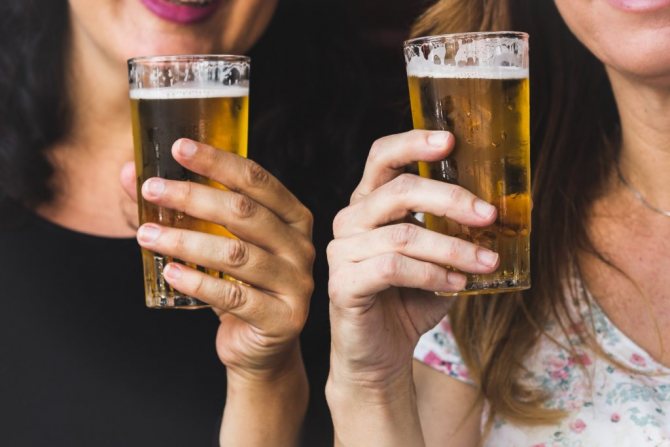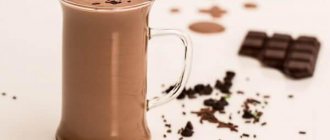Composition of non-alcoholic beer
The composition of non-alcoholic beer includes: water, malt, hop products and maltose molasses.
The hop product is processed hop cones and has a long shelf life. It is a substitute for real hops. When consumed it does not cause negative consequences.
Malt is widely used not only in brewing, but also in baking. Reduces brewing time.
Maltose molasses has similar properties to kvass wort. It is a necessary component of the fermentation process. Just like malt, it reduces the brewing time of the drink. Maltose molasses is harmless, but hardly tastes good.
The non-alcoholic product is rich in B vitamins, contains sodium benzonate , which negatively affects the structure of DNA, glucose-fruit syrup and cobalt (a substance that has a bad effect on the heart and gastrointestinal tract).
Composition of the drink
The foamy malt drink contains a low percentage of ethanol: from 0.5 to 2%. Its composition is practically no different from traditional beer. By carefully studying the label on the bottle, you can find out what ingredients it contains:
- water;
- malt;
- hop;
- yeast cultures;
- maltose syrup;
- B vitamins;
- folic acid;
- natural antioxidants;
- iron;
- branded additives of natural origin (spices or herbs).
The drink is produced using almost the same technology as regular beers. The components are heat treated, after which yeast is added to the finished liquid, which prevents the processing of maltose. To stop fermentation, the method of sharply cooling the brewed drink is widely used. This method neutralizes subsequent fermentation of yeast cultures and ultimately produces a liquid with a low alcohol content.
The membrane dealcoholization method is popular in modern factories. Ethanol molecules are passed through reverse osmosis or dialysis. The result is a drink with a fairly low alcohol content. The advantage of membrane dealcoholization is that the production of the product does not require a long time. The calorie content of non-alcoholic beer is 26 kcal per 100 g of product. The drink does not contain proteins or fats, but it does contain carbohydrates in the amount of 6.1 g.
How non-alcoholic beer is made
This drink is produced using a slightly more complex technology than regular alcoholic drinks, which is why it costs more. It contains a very small percentage of alcohol (1.5-2%). This is due to a decrease in the fermentation time of the drink during its creation. To increase the shelf life of such beer, preservatives and additives are added to it. To keep the alcohol percentage low, beer goes through the following stages: evaporation, suppression of fermentation and membrane filtration.
The result is non-alcoholic beer , which cannot have a negative impact on human condition and health.
Why does a nursing mother want beer?
For many mothers, the desire to drink comes as a surprise, since before they had no particular craving for it.
Beer contains B vitamins, which help restore and maintain metabolism, are responsible for the stability of blood sugar levels and reduce the effects of stress.
Brewer's yeast contains a special substance, which is subsequently converted through chemical processes into vitamin D2, which regulates the amount of calcium and phosphorus in the human body. Helps maintain normal condition of nails, hair and teeth.
The cravings of a nursing mother are explained by the lack of these beneficial substances that help maintain health. You need to think about changing your diet .
How does beer affect breast milk?
Whether a nursing mother can drink non-alcoholic beer is a controversial question. It affects the production of breast milk. Since the drink penetrates into the body, it also penetrates into the milk. Many mothers believe that drinking beer while breastfeeding, even non-alcoholic, helps increase lactation. This is wrong.
Scientists have proven that alcohol tends to accumulate in tissues, which subsequently leads to their stretching and swelling. This is why it seems that there is supposedly more milk than before drinking the mash drink. But beer retains fluid in the body, and because of this, it becomes difficult for the baby to suck mother’s milk, and he quickly gets tired. In the end , the baby simply stops doing this, never getting enough.
The effect of beer on a baby
This drink contains a component such as ethyl alcohol, which negatively affects not only an infant, but also an adult. This substance has a destructive effect on the liver, heart, blood vessels, the entire nervous system, as well as the hormonal and reproductive systems.
If a mother drinks alcohol every day while breastfeeding, this can lead to adverse consequences. The baby will begin to get sick often, gain weight poorly and lag behind in mental development, which can lead to mental retardation in the future.
The baby’s body does not yet have enzymes that can break down and remove alcohol and other harmful substances from the body. If a dose of alcohol enters the body of an infant, it can lead to the following consequences:
- there is a chance that a child will develop an addiction from an early age;
- allergy;
- Drinking alcoholic beverages can disrupt the digestion process and cause indigestion;
- since the liver is not yet able to cope with alcoholic beverages, it will turn into scar tissue due to cell degradation and death;
- the nervous system will suffer. Poor sleep, developmental delays and motor skills disorders can occur due to beer entering the child's body;
- In the most extreme cases, mother's alcohol consumption can lead to epilepsy and death.
Features of the drink
In fact, non-alcoholic beer, no matter how strange it may sound, contains a small percentage of ethyl alcohol. For various manufacturers it is 0.1-2. Of course, this dose is very low for an adult. But the danger of ethyl alcohol is that it still penetrates into mother's milk. Moreover, the concentration in this case is the same as the amount of alcohol in the blood after drinking non-alcoholic beer. But children's bodies do not produce enzymes that break down alcohol. Consequently, even the smallest dosages can harm the baby. A newborn is essentially defenseless. All substances contained in mother's milk penetrate into the child's body. As a result, the child’s nervous system and liver suffer.
The baby receives no less significant harm from the chemicals contained in the non-alcoholic version of the intoxicating drink. In fact, any bottled beer has a questionable composition. It contains flavorings, preservatives, and dyes. These are potential allergens that are harmful even to healthy adults. Such substances are completely dangerous for a baby. The safety margin in the infant body is high, so the harmful effects of drinking beer by a nursing mother will not be immediately noticeable. But even if a child does not break out in a skin rash after one bottle of soft drink, this is not a guarantee that he will not have problems with the digestive system as he ages.
Child's age
From 0 to 3 months
During this period of the baby’s life, a nursing mother is strictly prohibited from drinking even non-alcoholic beer. The body of such a small child is very sensitive to alcohol, and drinking this drink leads to negative consequences .
From 3 to 9 months
At this time, the mother's diet becomes more varied, as she begins to exit the postpartum diet. A new product can cause allergies in your baby, so you should not use such products.
Impact: benefits and harms
Before drinking non-alcoholic beer, you need to carefully think about its beneficial and harmful properties. Despite the loud name “non-alcoholic”, the product contains ethanol. For a breastfeeding woman and in the early stages of pregnancy, the drink is dangerous:
- rapid leaching of potassium from the body (beer has a diuretic effect);
- increased testosterone production;
- deterioration of lactation;
- occurrence of headache.

All substances received by the female body end up in milk, which the child feeds in the first months of life. Ethanol “settles” in the biological fluid and destroys the baby’s fragile body. With frequent or uncontrolled consumption of non-alcoholic beer by a woman, the following symptoms are observed in the infant:
- lethargy, drowsiness, apathy, loss of appetite;
- immunity decreases;
- developmental delay, slow weight gain;
- upset stomach, colic, liver disease;
- epileptic seizures (in rare cases);
- allergy.
The consequences are a rather rare occurrence, but according to reviews from nursing mothers, symptoms sometimes appear. It is important to protect the child as much as possible from the influence of ethanol. To do this, it is better to forget about alcohol during lactation.
Rules for drinking non-alcoholic beer
Before drinking such a drink, a nursing mother needs to carry out a preparation procedure. Because it is prohibited to give your child milk containing alcohol in the near future.
So, the preparation procedure for use is carried out as follows:
- Milk must be expressed for one or more feedings, since the baby cannot be fed alcoholic milk. It should be remembered that expressed milk can be stored in the refrigerator for no more than a day!;
- When drinking beer, release all the gases from it;
- you can only drink a high-quality product made from natural ingredients;
- Feed your baby before you drink. Conduct the following feedings only in a sober state;
- try to drink beer produced less than two months ago;
- If after drinking beer you discover an allergy in your child, you should immediately consult a doctor.
The most dangerous feeding time occurs 30-60 minutes after the mother has drunk something forbidden. It is excreted within 2 or more hours , it depends on the mother’s body weight.
Video about non-alcoholic beer
In a short video, a narcologist expresses a professional opinion about this drink, argues his own point of view on the harmfulness of such use,
Nursing mothers may have their own reasons to drink: for example, birthdays or New Year's holidays. On the other hand, during the year after giving birth, it is easier to completely give up a potentially harmful drink than to calculate the intervals of time, pump and think about how this will affect the child’s health. Opinions about whether it is possible to drink non-alcoholic beer while breastfeeding vary widely. What do you think? Write your pros or cons in the comments below.
Myths about the benefits of drinking beer
There are a huge number of opinions about the benefits or harms of beer during breastfeeding. Some talk about its healing effect, others have a negative attitude towards alcoholic beverages. But is it? Let's look at common myths:
- beer changes a child's sleep . Is it true. But it doesn't change for the good. Due to disturbances in the functioning of the nervous system, the baby begins to sleep poorly;
- it helps produce more milk . Not true. Drinking beer while breastfeeding slows down milk production.
Is it possible to drink non-alcoholic beer while breastfeeding?
Harmful substances (among them fusel oils) contained in regular beer reach breast milk in about half an hour. It is enough to consume only 350 ml of liquid. Is it possible to allow yourself non-alcoholic beer while breastfeeding? A drunk bottle is harmless to the baby. Unless the manufacturer uses other, completely unhealthy or completely prohibited impurities in the manufacturing process. Food additives, chemicals, preservatives - all this is harmful to the health of a woman and her child.
This is interesting! The composition of non-alcoholic and traditional beer is almost identical. Only the percentage level of alcohol content differs. However, the non-alcoholic type is not healthy or alive, because it contains harmful carbon dioxide, phytoestrogens, dyes, and a heavy dose of sugar.
Can a nursing mother drink non-alcoholic beer without restrictions? The answer is simple: you can't. It contains a small dose of ethanol. Drinking several mugs at once will have a bad effect on the baby.
It has been scientifically proven that the body of a child under 12 months is powerless against ethanol. But is it possible to drink beer in moderation while breastfeeding a newborn? Once it penetrates the barriers of the developing organism, the toxin leads to serious problems:
- impaired development of the brain, liver, and other organs;
- slowdown of metabolic processes;
- decreased activity of enzyme systems;
- damage to protective barriers, decreased immunity.
Systematic abuse of alcoholic beverages has the following negative consequences for infants:
- risk of developing hypoglycemia (drop in glucose to a critical level);
- underweight;
- sleep disturbance;
- low pressure;
- tachycardia.
The above phenomena often lead to a slowdown in the physical and mental development of the baby.
Can a nursing mother have ethanol-free beer if her baby is 3 months old? Yes, but a little. But it’s better to beware of beer evenings throughout the entire GW period.


